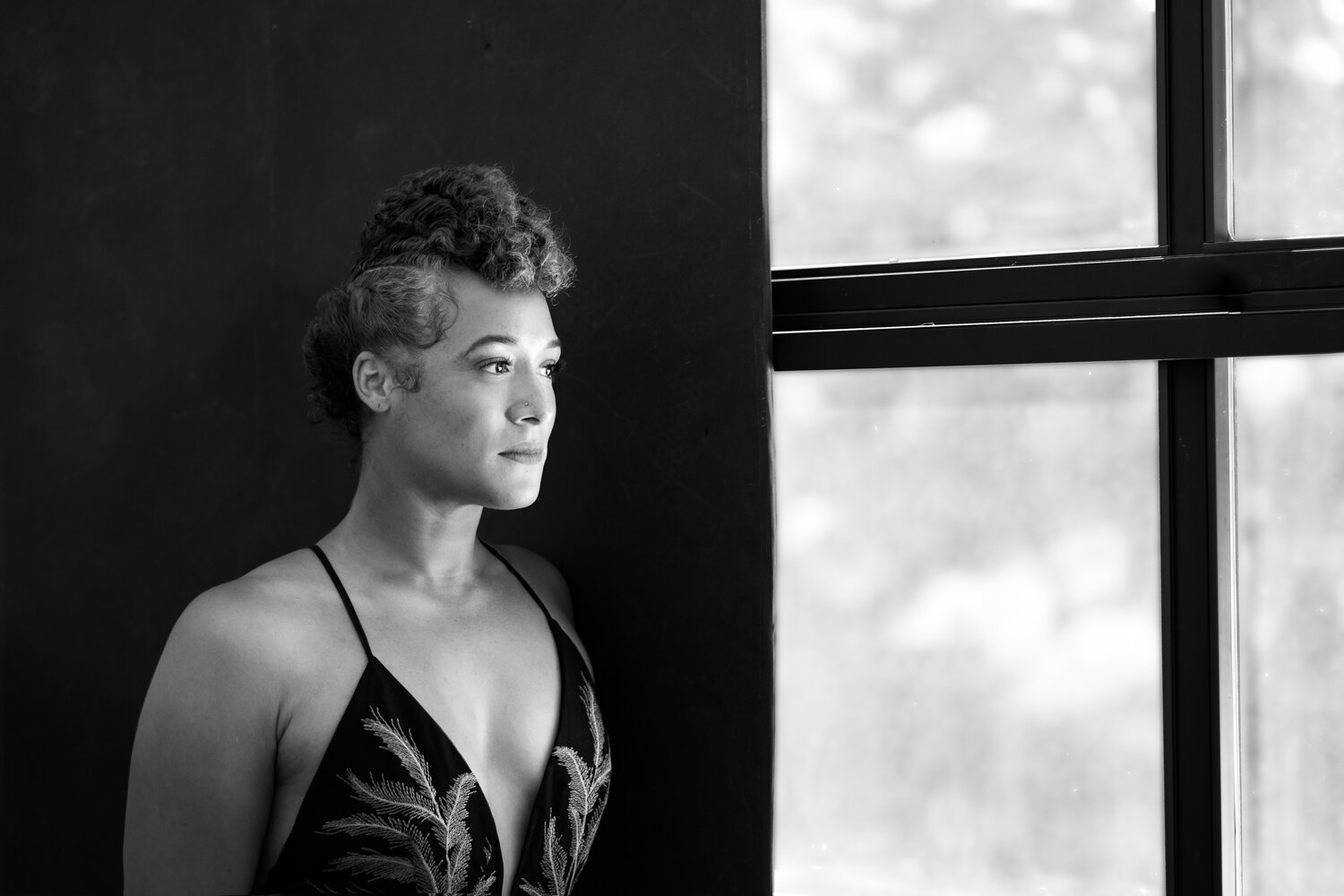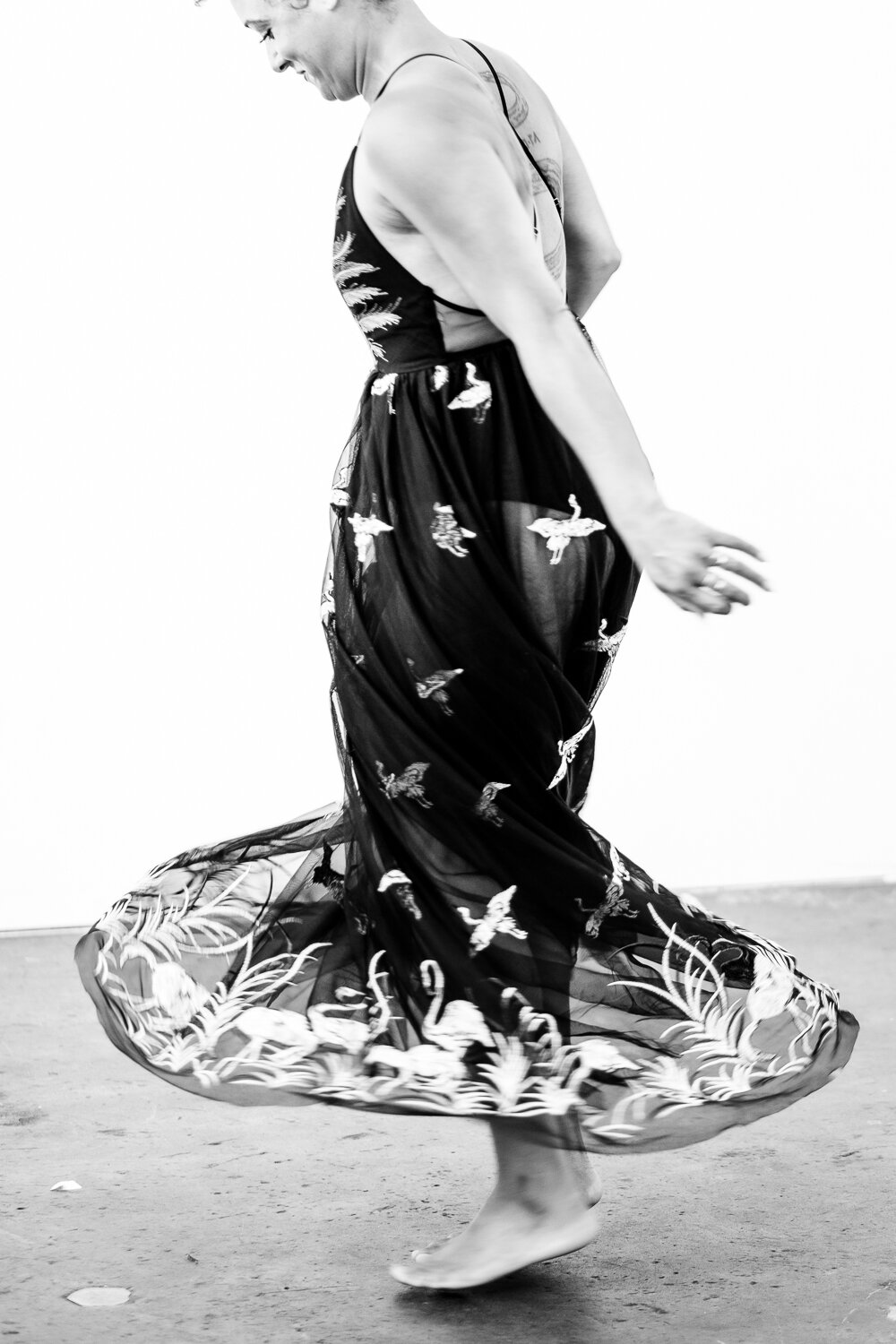Jocelyn Rice entered the room wearing handsome blue herringbone coveralls, personalized with her own art. Her choice of apparel was inspired by the “Jim Crow Traveling Kit”. The idea during that time period was that the coveralls would protect Black travelers from the common actions of being spit on, by train conductors and business owners. It protected their fine clothing underneath. This cloth suit of armor gave people a chance to arrive at their destinations unscathed. But we know all too well, that wasn’t always the case. Rice adds her own powerful graphics to her coveralls, “whenever I am feeling frustrated with what’s going on.” In such a historically stark choice of clothing, Rice’s stature was noticeably strong, her face and smile, warm and radiant.
Rice brought a book with her, which she treasures along with her 300+ book collection she has at home. This book, Women Who Run with Wolves by Clarissa Pinkola Estés, focuses on women and healers. It continuously draws her back in with the promise of finding reflection, healing and inspiration. Along with the book she carried a ceremonial bowl and sage, aligning with Rice’s presence and purpose.
“I aspire to be a ceremonial grade designer, channeling those that came before me, channeling my ancestors through my designs.“ Rice confirms.
“I aspire to be a ceremonial grade designer, channeling those that came before me, channeling my ancestors through my designs.“ Rice confirms.
Born on the West Coast in Eugene then raised in the heart of the Midwest, Jocelyn Rice, the eldest of five female siblings, emits confidence and a down to earth radiance of the very plains she was raised near. She is a single mother to a son she deems “the dopest, funniest and most compassionate 9 year old alive today.” As an apparel designer and a creative, Rice shares that her approach “is to consider the community’s economic condition, social conditions, political landscape, community culture, geography, and human capital/resources when designing.”
Rice’s creative work has been featured in OK Magazine and Vogue and has also acquired national awards. Her full life includes public speaking throughout Portland, from high schools to universities, expressing her passion for designing apparel and how she approaches her designs.
“A project I’m excited to be working on right now is an online conference, BIPOC. This is where outdoor community, from designers, educators, influencers, businesses, creatives, policy makers, and environmentalists, talk in one place about the huge problems in the outdoor industry. The goal is to bring the outdoor community together as change makers in a racist system, and tackle issues of diversity and BIPOC representation within outdoor companies, places and spaces in a tangible way.”
“After more than a decade working as an apparel designer in the Outdoor Industry, I decided to embark on my own journey and launch Black Earth United. My primary focus has been to amplify and advocate for Black and Brown folks in the outdoors through learning from the lived experience of others. We know BIPOC peoples were separated from their natural and cultural connections to the land. And we seek to celebrate and honor sacredness to prevent their erasure from the narrative through the designing of products, places, and conversations.”
Across the world, the movement to fix systemic racism is being brought to the headlines of our news and the forefront of our streets. Daily protests throughout cities bring an unignorable attention to the hatred and mistreatment of BIPOC, especially in the U.S. The movement also highlights the police brutality that plagues every state.
When asked about the resurgence of BLM: “I think a lot of folk entered a realm of alert consciousness that made them aware of their external and internal environments.” says Rice, “But I don’t really think this movement has a new momentum. It was always there. When Alicia Garza, Patrisse Cullors and Opal Tometi founded The Black Lives Matter Movement 6 years ago on July 13th of 2013 as a result of Trayvon Martin’s murder, it began as a call to action in response to state-sanctioned violence and anti-Black racism and its been on this steady crescendo for 6 years. Do I have any expectations? As a human, yes, I expect Americans to act and use their active intelligence to educate themselves. I expect European Americans, ‘white’ folks to surrender their power, resources and money to allow access for Black folks, muslims, immigrants, and for POC. My hopes? I don’t hope, I believe. I believe this new civil rights era, that is just in its infancy, will result in a full and rigorous life-cycle audit of America’s political, social, and economic structures and histories. I believe that we will completely rebuild and transform this country. And fear? I try not to invite fear into my life anymore.”
We asked her about behaviors she has to be conscious about based on the color of her skin. Rice quotes Raja Schaer, “We do this code-switching thing to survive in America (hide an accent, change our pitch, etc). We do it in the workplace, in academic institutions, around family members, but when you call me out in public, when you take my mask off in public as another, you are embarrassing me. I think, do we have to do this now!? Can’t we do this privately? Somewhere else? Or do we need to have this out right now? Allow me, as an employee, a student, to come to you and let you know I am willing to engage with you on some layer of my identity. And if it’s race, let’s talk about it. But do not call people out, or single people out in public. You have to build those relationships first.” “I find this quote tangible on so many layers, as a woman, as a Black woman, and as just being black, others feel it is acceptable to point out faults and modifications that let them, the complainer, feel more comfortable.
A running thread is how much of the world forces Black people to modify who they are so the rest of the proverbial ‘us’ feel ‘ok’.” Rice continues this thought, adding that her experience as a Black woman in society is certainly not an easy one, but she finds it beautiful and inspiring. Fighting against all odds for a freedom that was promised to everyone. Embracing the right to be her own beautiful and powerful self. She leaves us with a quote from Toni Morrison, “‘You are your best thing.’ So go get your dreams, sis!”
Interview & story by Jennifer Randall
Editing: Calcio Rose
Photographs: Shawnalee Anderton
Go here you would like to be a part of Be Seen Be Heard









